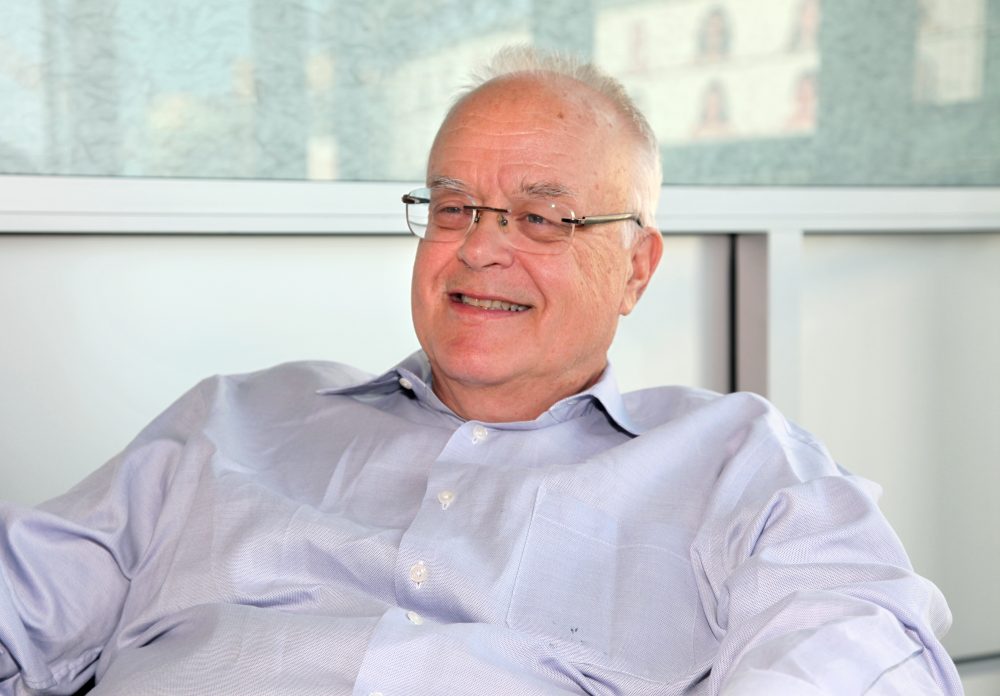
Photo by Aaron Salcido.
Garrett Epps is a professor of constitutional law at the University of Baltimore School of Law and serves as The Atlantic’s Supreme Court correspondent. Before taking part in a Zócalo/Daniel K. Inouye Institute event titled “How Can Americans Defend the 14th Amendment When the Government Won’t?” he spoke in the green room about Uzbek literature, country music, and growing up in the South.
What are you reading for pleasure?
I am reading a book called The Devils’ Dance, by Hamid Ismailov, which is the first Uzbek novel ever translated directly into English, because I spent time in Uzbekistan. It’s written by a contemporary Uzbek novelist, and it’s the story of an actual Uzbek novelist who was imprisoned by the Soviets in the great Stalin purge and died in prison. But [Ismailov] is imagining this guy trying to keep the novel going while he’s in prison, because he’s hoping to get out.
What were you doing in Uzbekistan?
I was just there; I’ve always wanted to go there. It’s the Silk Road, it’s really the center of the world, in a sense, Samarkand and Tashkent, and the Islamic Enlightenment was there. So I went there and spent two weeks seeing everything I could.
What do you do to unwind?
Nothing all that interesting. I watch a lot of TV. I’m really upset that Nashville is going to end. As a Southern boy I really like country music. I was brought up not to like country music, we weren’t supposed to like country music, which made it incredibly attractive. It was a class thing. So late at night I would listen to country music under the covers.
Who were your favorites?
Well, Hank [Williams]. There was just nobody like that. And Willie Nelson. I don’t like so many of the new guys with the brand new cowboy hats, but some of them are okay. I really liked the Dixie Chicks, I thought they were great. Pistol Annies, I like them a lot—they’re kind of doing what the Dixie Chicks had to stop doing.
Were there some good juke joints where you’d go in Richmond, where you grew up?
There were, but we weren’t allowed to go there. I remember my mother said, “Pedal steel [guitar] is for trash.” I like pedal steel!
If you could time travel, where would you go?
If I could lurk along between 1941 and 1953, because the way people lived then is underreported, it’s under-reflected in our historical literature. Particularly the white people who write history don’t want to remember what life was like under real segregation. And there’s a lot of accounts of what it was like for black people, but there’s very little telling—I mean, [William] Faulkner does some of this—of just daily life, or on the street. Black people and white people living in the same place under this crazy ideology in which they’re supposed to be separated. I’ve done a lot of reading of diaries and manuscripts and stuff, and yet it’s still mysterious to me. And of course I would go back to 1866 to watch the framing of the 14th Amendment.
Was there a professor who really influenced you, maybe even helped set a direction for your career?
My constitutional law professor in law school was a man named Walter Dellinger, who was later acting Solicitor General and headed the Office of Legal Counsel under President Clinton. So he was a very high-powered guy. And he and I are both Southern boys from the upper South—I’m from Richmond, he was from Charlotte. We both knew a lot about the Civil Rights movement and so forth. So that was really fun, studying constitutional law with him. And I probably would’ve ended up doing constitutional law anyway, but that certainly made it easier. And then I took constitutional history from John Hope Franklin, and that was the last time he taught it, and it was an extraordinary experience. So I often think about what he would think about what was going on now.
Growing up in the South, was there a personal experience that really crystallized what the Civil Rights movement was about?
Well, I think it’s almost the reverse: It was virtually impossible not to feel it. I grew up in the white part of the South, and people were constantly talking about, “Why do they want us to change? Why should we have to change? Does the Constitution say we have to change? What does the Constitution mean?” You know, at the age of eight, nine, 10, you hear the adults around you talking about the Constitution all the time. And then being exposed to what federal judges and the courts were doing, ordering big changes because of what the Constitution requires. It was an amazing time to grow up if you’re interested in the relationship between law and social mores. The other thing that was so striking to me—I was 14 when the Civil Rights Act of 1964 was passed, pretty much the end of legal segregation in public accommodations and so forth—and [white] people had been saying, “This is going to be awful, this is going to be the end of the world …” I promise you that within 12 months after that people were saying, “What the hell was that all about?” People said, “Law can’t change the human heart.” Well, it turns out that it can.
What’s your next job?
Well, I’d like to write for TV. Anything that involves writing I enjoy. It’s sort of like, “What does a heroin addict do to relax?” Shoot heroin, right? That’s what I do as far as writing. I’m addicted to it.



